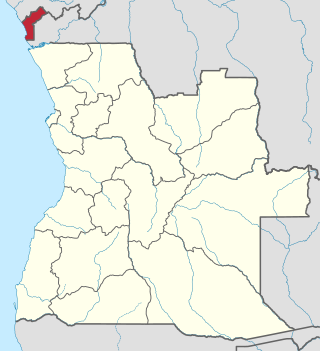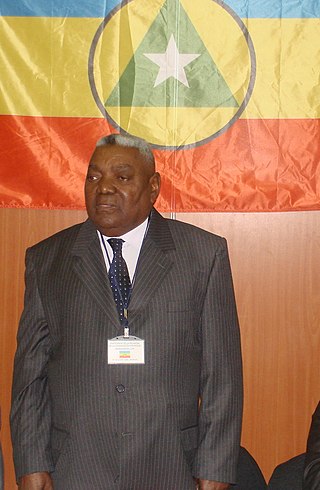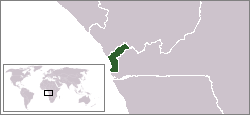Related Research Articles

Cabinda is an exclave and province of Angola, a status that has been disputed by several political organizations in the territory. The capital city is also called Cabinda, known locally as Tchiowa, Tsiowa or Kiowa. The province is divided into four municipalities—Belize, Buco-Zau, Cabinda and Cacongo.

The Front for the Liberation of the Enclave of Cabinda is a guerrilla and political movement fighting for the independence of the Angolan province of Cabinda. Formerly under Portuguese administration, with the independence of Angola from Portugal in 1975, the territory became an exclave province of the newly independent Angola. The FLEC fights the Cabinda War in the region occupied by the former kingdoms of Kakongo, Loango, and N'Goyo.
The Communist Committee of Cabinda was a militant separatist group fighting for the independence of Cabinda from Angola. The CCC was led by Kaya Mohamed Yay and Geraldo Pedro. It split off from the Front for the Liberation of the Enclave of Cabinda (FLEC) in 1988.
This is a historical timeline of Portugal.

The Forças Armadas de Cabinda (FAC), or Armed Forces of Cabinda, is the armed wing of the political Cabindan nationalist group Frente para a Libertação do Enclave de Cabinda. the Movement for the Liberation of the Enclave of Cabinda (MLEC) in Léopoldville in 1959, chaired by Luis Ranque Franque, the Action Committee of the Union Nationale Cabindaise (CAUNC) in Brazzaville in 1961, chaired by Henrique N'zita Tiago and the Alliance du Mayombe in Pointe-Noire in 1962, chaired by António Eduardo Sozinho Nzau. In 1963, the three separatist political movements merged to found the Front for the Liberation of the Enclave du Cabinda (FLEC), based in Pointe-Noire.
Cabinda may refer to:

The Republic of Cabinda was an independent protectorate of Portugal that was taken over by Angola after Portugal declared Angola a free country. It is currently an unrecognized state, which Angola considers its Cabinda Province property. The Front for the Liberation of the State of Cabinda-Exército de Cabinda (FLEC) claimed sovereignty just after the Republic of Cabinda was proclaimed as an independent country in 1975 from Portugal and just after Angola invaded. The government of this entity operates in exile, with offices located in Paris, France, and Pointe Noire, Republic of the Congo.
The Movement for the Liberation of the Enclave of Cabinda is a defunct, separatist organization that campaigned for the independence of Cabinda province from Portugal. MLEC merged with the Action Committee of the Cabinda National Union and the Mayombe National Alliance in 1963 to form the Front for the Liberation of the Enclave of Cabinda. Cabinda is now a province and an exclave of Angola.
The Action Committee of the Cabinda National Union is a defunct, separatist organization that campaigned for the independence of Cabinda province from Portugal. CAUNC merged with the Movement for the Liberation of the Enclave of Cabinda (MLEC) and the Mayombe National Alliance in 1963 to form the Front for the Liberation of the Enclave of Cabinda (FLEC). Cabinda is now a province and an exclave of Angola.
The Mayombe National Alliance is a defunct, separatist organization that campaigned for the independence of Cabinda province from Portugal. ALLIAMA merged with the Action Committee of the Cabinda National Union and the Movement for the Liberation of the Enclave of Cabinda in 1963 to form the Front for the Liberation of the Enclave of Cabinda (FLEC). Cabinda is now a province and an exclave of Angola.
António Bento Bembe is the Secretary-General of the Front for the Liberation of the Enclave of Cabinda (FLEC), a general of Angolan Army, a minister without portfolio in the Angolan government between 2007–2009. He is the Secretary of State of the Angolan government for Human Rights, has served as the President of the Cabinda Forum for Dialogue (FCD) since its establishment in 2004. He served as President of FLEC-Renovada.
Democratic Front of Cabinda is a separatist rebel group that fights for the independence of Cabinda province from Angola.

Henrique N'zita Tiago was a commander of the Armed Forces of Cabinda, a rebel guerrilla group that fights for the independence of Cabinda from Angola. He died in Paris on 3 June 2016. It was reported that Tiago was 88 years old when he died, and that he was buried in France.

The Liberation Front of the State of Cabinda is a separatist movement seeking the independence of the Angolan province of Cabinda. It was founded in the Netherlands in 1996 by a group of Cabindese expatriates.

A terrorist attack occurred on 8 January 2010 as the Togo national football team traveled through the Angolan province of Cabinda on the way to the 2010 Africa Cup of Nations tournament, two days before it began in Angola. A little-known offshoot of the Front for the Liberation of the Enclave of Cabinda (FLEC), a group promoting independence for the province of Cabinda, known as the Front for the Liberation of the Enclave of Cabinda – Military Position (FLEC-PM), claimed responsibility for the attack. Bus driver Mário Adjoua, the team's assistant manager Améleté Abalo, and media officer Stanislas Ocloo were killed, with several others injured. Secretary General of the FLEC-PM Rodrigues Mingas, currently exiled in France, claimed the attack was not aimed at the Togolese players but at the Angolan forces at the head of the convoy. Authorities reported two suspects were detained in connection with the attacks.
Rodrigo Rodrigues Mingas is the leader of the Front for the Liberation of the Enclave of Cabinda-Military Position, a guerrilla independence movement fighting since 1975 for the total independence of Cabinda, one of Angola's 14 provinces which is rich with oil reserves.

The Cabinda War is an ongoing separatist insurgency, waged by the Front for the Liberation of the Enclave of Cabinda (FLEC) against the government of Angola. FLEC aims at the restoration of the self-proclaimed Republic of Cabinda, located within the borders of the Cabinda province of Angola.
This is a list of events in the 2010s in Angola:
The Angolan exclave of Cabinda has been the site of a separatist conflict since the Angolan War of Independence. The separatist side is represented by several organizations, the largest of which is the FLEC, which maintains the armed forces of the Republic of Cabinda.